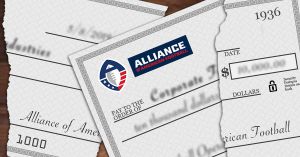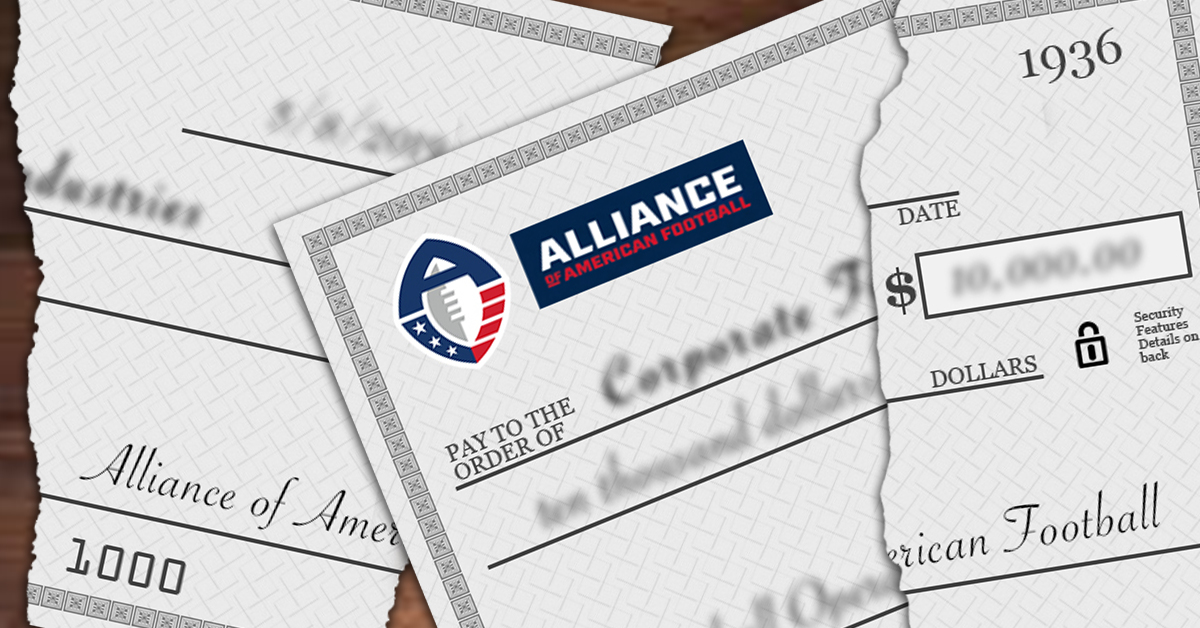
Ultimately, it was the little things that best told the story of how dire things had gotten for the Alliance of American Football (AAF), an ex-team social media manager said. Starting in Week Five, social media managers no longer traveled with the team for road games. Even before, they’d doubled up on hotel rooms. The final bit of penny-pinching was the most bizarre: For the eighth and final AAF game, social was told Getty’s photographers would not be in attendance. Instead they would have to rely on “generic images,” making the job vastly more difficult.
Less than a week later, on April 2, the chaotic, short-lived lifespan of the spring professional football league, launched in March 2018 by filmmaker Charlie Ebersol, the son of venerated TV producer Dick Ebersol, came to an abrupt end. A little over two weeks after that, the AAF filed for bankruptcy, as first reported by Front Office Sports.
In the aftermath, stories like the social media manager’s have become ubiquitous. A former player was sent a medical bill for treatment received during training camp. Scores of others reportedly had to cover their own airfare or were sent four-figure bills for hotel rooms. There was the class-action lawsuit filed by two players, claiming that ownership misled them about the league’s long-term fiscal solvency. Founders pointed fingers at one another after the debt-ridden league came crashing down. All manner of now ex-employees, from team officials to players, learned they were out of a job thanks to social media.
+On the day the league shut down, Tom Dundon was golfing. Some team level employees were "enraged and wanted to publicly criticize Dundon's lack of empathy as hundreds of people were losing their jobs."
— Rich Ohrnberger (@ohrnberger) April 10, 2019
The league’s bankruptcy filing revealed that $48.3 million was still owed to a variety of creditors against a $11.3 million in concrete assets, a scant $536,160.68 of which remained in the league’s bank accounts. Moreover, the AAF informed the thousands of creditors that any attempts to recoup their losses would be pointless right now, because, per Sports Business Journal, its coffers are entirely bare… “If it later appears that assets are available to pay creditors, the clerk will send you another notice telling you that you may file a proof of claim and stating the deadline,” the filing states.
A season ticket holder for the #Apollos just shared an email with me from a lawfirm with this attached: A notice of bankruptcy. @dkaplanSBJ reported the AAF has "no money for creditors and instructed the thousands of them to stop filing claims." Odd that this email was sent out. pic.twitter.com/LtMjcoZS2f
— Jason Beede (@therealBeede) May 1, 2019
But like the social media manager, many of those selfsame creditors began to suspect the AAF was on rocky financial ground long before the league officially pulled the plug.
Shortly after Tom Dundon, the majority owner of the NHL’s Carolina Hurricanes, who built his financial empire on the backs of subprime auto loans, bought a majority share of the financially-strapped league, he started to cut corners, looking to pare down expenses by any means necessary according to a report by Sports Illustrated. “As soon as Dundon took over, our f——— expense reports were getting approved out of Dallas,” where Dundon Capital Partners’ office is located, a former mid-level AAF employee told the magazine. (Dundon did not respond to multiple requests for comment sent via the Carolina Hurricanes. The form to contact Dundon Capital Partners on their website was removed at some point in the past few months )
With the AAF bleeding millions each and every week it remained in existence, per USA Today, Dundon deemed it necessary to scrimp and save wherever possible including on the margins. So vendors—companies that supplied locker room supplies, traveling equipment and more—were approached hat in hand and offered less than the full amount owed by the AAF.
READ MORE: AAF Files for Chapter 7 Bankruptcy
While AAF officials served as the point of contact, two sources involved with the negotiations told Front Office Sports that the debt-clearing plan was conceived and ordered by Dundon’s financial team. If that meant exploiting AAF officials’ pre-existing relationships with vendors and playing on the faith placed in the league, so be it. As one former AAF official told Front Office Sports, it was “just a shit situation.”
Some of the companies did take the lowball offers, but others refused to accept less, insisting on full payment. It didn’t matter. Both paths led to vendors getting stiffed by the AAF. Dundon’s financial team kept stalling, promising the equivalent of “the check’s in the mail,” right up until the moment when the AAF closed its doors for good.
Now those vendors have been reduced to poring over the bankruptcy filings. They know all too well that, despite being out five or six figures, they’re way at the back of the line, trailing giant conglomerates like MGM and Aramark which are owed millions. And they’re not happy about it.
“I definitely feel scammed,” one vendor said.
Otis Jackoboice is the 49-year-old owner of Olympic Case Company, a Tampa, Florida-based supplier of custom cases, trunks and workboxes. In November, he was contacted by the AAF. The league ended up ordering $118,537.79 in goods from Olympic Case. Reached by phone, Jackoboice said initially he was “thrilled.”
Excited for the Inaugural Season of The Alliance of American football. Teams are all geared up and ready for kick off tomorrow #aaf #olycase #football #roadcases #quality pic.twitter.com/fXmVSScMSD
— Olympic Case Co. (@OlycaseCo) February 9, 2019
He’d previously worked with Darwin Beacham, the AAF’s then-head of equipment, and the presence of established and respected football figures like Bill Polian, a storied NFL executive, led him to believe that the AAF was in it for the long haul. (Beacham declined to speak on the record.) Polian referred Front Office Sports to a previous public statement, in which he blamed Dundon for shuttering the AAF. When Front Office Sports mentioned that multiple vendors said his involvement reassured them that the AAF was on strong financial ground, Polian replied, “That was my impression as well.”
The first sign of significant trouble came in March, when Jackoboice received a call from Beacham. The equipment head offered him $90,000 in compensation. At first, Jackboice assumed this lump sum would be followed by a payment plan and timeline in which the AAF would cover the remaining balance. It soon became apparent that this was all that would be coming his way.The league was asking him to gift them $28,000.
No way, Jackoboice replied. Something else struck him, too. None of his prior interactions with Beacham had ever been like this.
“You’re not the one asking me for this,” Jackoboice said he asked Beacham. “Who is asking that I take a haircut?” According to Jackoboice, Beacham said he was directed to do so by Kevin Farrell, the then-AAF head of corporate operations.
So Jackoboice moved his complaints up the food chain. Multiple emails were sent and phone calls placed to Farrell, who did not respond. (Via text message, Farrell told Front Office Sports: “Sorry, I can’t talk right now.” He did not respond to further requests for comment.) As he waited for answers, Jackoboice began speaking with other vendors. It’s a fairly close-knit world, he said. Vendors compare notes, and when one snags a contract, word spreads fairly quickly. In this instance, they’d been fed similar reassurances with scant few results. To them, it all seemed reminiscent of a recent and infamous case of widespread fraud.
“Every time we had a conversation in the last week, everyone started with the same thing: ‘Hey did you see that Fyre Festival documentary?'” he said.
One of the vendors Jackoboice reached out to was Dan Linsell, head of sales for Duffy’s Tri-C Club Supply, a Michigan-based company that provides locker room toiletries and related equipment to hotels, resorts, and sports teams. In early November, he also heard from Beacham about supplying the AAF. Like Jackoboice, the presence of trusted industry veterans such as Bob Wick, the Birmingham Iron trainer who’d previously been with the San Diego (now Los Angeles) Chargers for over two decades, led Linsell to believe that “[the AAF] is probably the real deal,” he said. “And it was nothing but BS.”
While his dealings with the AAF went south in a matter of months, Linsell doesn’t blame Beacham for what happened.
“I think he was sold a bill of goods, too,” Linsell said.
But unlike Jackoboice, Linsell at least got some of the money his company was owed: two payments of 14,499.56, which were sent by the AAF on November 20 and January 14. Additional orders kept coming in, though, and Linsell — “stupidly,” as he described it — went ahead and filled them. As the unpaid invoices continued to mount in February, he was told by the AAF the payments were “in the system.” Currently, the AAF owes Duffy’s Tri-C $17,687.79, according to both Linsell and the AAF’s bankruptcy filing.
One of his employees did manage to get Farrell on the phone. Though he doesn’t recall the exact date, Linsell said his employee was told: “You’re good. Check will be cut in a bit.” Naturally, Linsell grew suspicious. “Where the hell is it in the system?” he recalled thinking. “Are we next to be paid or are we a hundred down the line. We just don’t know.”
Neither he nor his employee heard back from Farrell again. He would have been willing to cut his losses, but the offer never arrived.
What neither vendor knew was this: The debt-reduction plan did not originate with Beacham, Farrell nor any other pre-Dundon AAF official they were dealing with, according to Marc Jacobson, the former AAF head of brands.
Reached by phone, Jacobson told Front Office Sports that the AAF’s finances were already strained by the time Dundon stepped in as majority owner, to put it mildly. Were it not for Dundon’s infusion of capital, sources told The Athletic, the AAF might not have been able to meet payroll that week. At the time, an AAF spokesperson denied that players were at risk of going unpaid.
By Jacobson’s account, the poor cash flow could be attributed to “[Reggie] Fowler’s inability to live up to contract.” Fowler, an entrepreneur with a history of defaulting on debts and inflating his resume, had originally pledged to spend $170 million on the AAF. In the end, his final contributions only amounted to $28 million. On April 30, Fowler was charged with bank fraud operating an unlicensed money transmitting business by the Southern District of New York. As Quartz noted, it appears he was looking to set up a series of “shadow banks” to fund cryptocurrency exchanges. If found guilty, he could serve up to 70 years in prison.
[mc4wp_form id=”8260″]
So when Dundon and his own set of financial advisors came on board, he went through the books line by line and saw a certain amount of still-present debt. “When you’re investing in something you don’t want to acquire old debt,” Jacobson explained. (After promising to invest $250 million after taking control of the AAF board two weeks into the season, in the end Dundon only coughed up $70 million. One bankruptcy attorney who took a gander at the filing called the AAF’s balance sheet “crazy.”) The goal, then, was to “wipe the books clean so that so that we had a clean slate moving forward.”
Dundon told the “senior business management side” of the AAF, as Jacobson described them, that if they were able to negotiate with vendors and reduce the amount owed, the league would make good on those agreements and payments would be sent out within 48 hours. Jacobson, Farrell and other AAF officials were charged with executing this task.
Another AAF official involved in trying to claw back money from vendors confirmed Jacobson’s version of the events. The initial meeting took place in early March, when several league officials travelled to Dallas to meet with Dundon’s “team,” he said via Twitter direct message. (The official was not present at this meeting, but Farrell was.) Originally, Dundon’s team suggested asking all for a ten percent reduction from vendors. If they balked, he was given the authority to go as low as five percent, the official said. By the official’s telling, only one vendor agreed with the proposed terms and the reduction was close to three percent.
“It sucked and [was] probably the worst thing I’ve ever done,” the official continued. “Just hate that they wanted to use my personal relationship with the vendors to work a deal.”
The vendors weren’t thrilled, either. Given the amounts still on their ledgers, they were “obviously upset at first,” Jacobson said. According to him, all the vendors Jacobson negotiated with knew from the beginning that there was always a “risk of this potentially happening,” meaning delayed or reduced payments.
Jacobson hadn’t spoken with Jackoboice nor Linsell, who offered a very different assessment of the financial picture the AAF painted. “[The AAF] misrepresented to people like me,” their long-term sustainability and liquidity, Jackoboice said. That’s also true publicly. As recently as February 20, Dundon boasted to a radio show that his investment meant the AAF had “enough money to run this league for a long time,” adding, with a laugh, “We’re good for many years to come with what I just did.”
Ebersol also promised that the AAF would be around for a while, with the hope of eventually becoming an official minor league of the NFL. Behind the scenes, Dundon and Ebersol were at loggerheads, with the former very much wanting the league to begin turning a profit sooner rather than later. The inability to score a lucrative TV deal with the networks was a major point of contention, and Dundon wasn’t nearly as interested in the AAF’s proprietary gambling technology, according to a detailed investigation by Sports Illustrated. (Ebersol did not respond to multiple requests for comment left on his voicemail, and a message sent to his AAF email address bounced back.) Two days before the AAF went kaput, Dundon finally confessed that dissolving the league altogether was one of many “options” he was considering.
“This was fraudulent,” said Jackoboice. “I don’t see it any other way. Start to finish they were deceiving people… They went into this knowing they couldn’t float this thing.”
Front Office Sports told Linsell that the bankruptcy filing showed Ebersol receiving over $300,000 in salary since March 2018, a level of compensation Axios called “way too much!” Two days before the AAF filed for bankruptcy, Ebersol was paid $14,583.33.
“Unbelievable,” Linsell said in response. “What a snake.”
Even so, Jacobson claimed the vendors he was dealing with were all willing to accept a “significant reduction” in order to move forward. Though he didn’t express this to the vendors, Jacobson was told that, in the future, “Team Dundon” would pre-approve any further expenditures to ensure that scenarios like these wouldn’t happen again.
The new management didn’t live up to its end of the bargain. “All of my vendors, not one that I negotiated with was honored,” Jacobson said. “They trusted my word. My word was given from Team Dundon, and it was never honored.”
As he describes it, Jacobson presented Team Dundon with the agreed-upon reduced packages and assumed they’d be rubber-stamped in short order. But as the days turned to weeks, he never received a concrete yes or no. The deals he put together with vendors—some of which he’d known for many years and maintained long-standing professional relationships—were never formally rejected.
Instead, “There was always a reason why [Team Dundon] couldn’t commit to it every week,” he said. “I feel horrific for some of these vendors.”
READ MORE: XFL Stays the Course Amidst Spring Football Craze
Meanwhile, he was fending off angry calls from vendors, and his only recourse was to insist that “due diligence” was still being performed. The same went for Farrell, who was “Getting hammered daily, daily, daily,” with calls, Jacobson said. “I wouldn’t wish what [Farrell] had to go through on anybody.”
He said he still has no idea why the AAF failed to live up to its contractual agreements.
“I don’t know if it was malicious that they never had an idea of paying,” said Jacobson. “I don’t know that. Obviously the end result would tell you that maybe they didn’t have any intention.”
For his part, Jackoboice partly blames himself for not thoroughly investigating the AAF before agreeing to work with them. He said Olympic Case is on solid enough footing that he won’t be forced to lay off employees if he never sees a dime. The same goes for Linsell, too. But other small to midsize establishments, like the local catering business in San Antonio that’s out over $200,000, were dealt a far greater blow.
“That breaks my heart,” Jackoboice said. “That’s not right.”
Had it been made clear that the AAF was a gamble, Jackoboice said he wouldn’t have invested nearly as much of his time and money. ”I didn’t go into this thinking it was a roll of the dice,” he said, before adding why he and so many others believed in this latest promise of spring football riches: “I thought this was a good deal.”
















